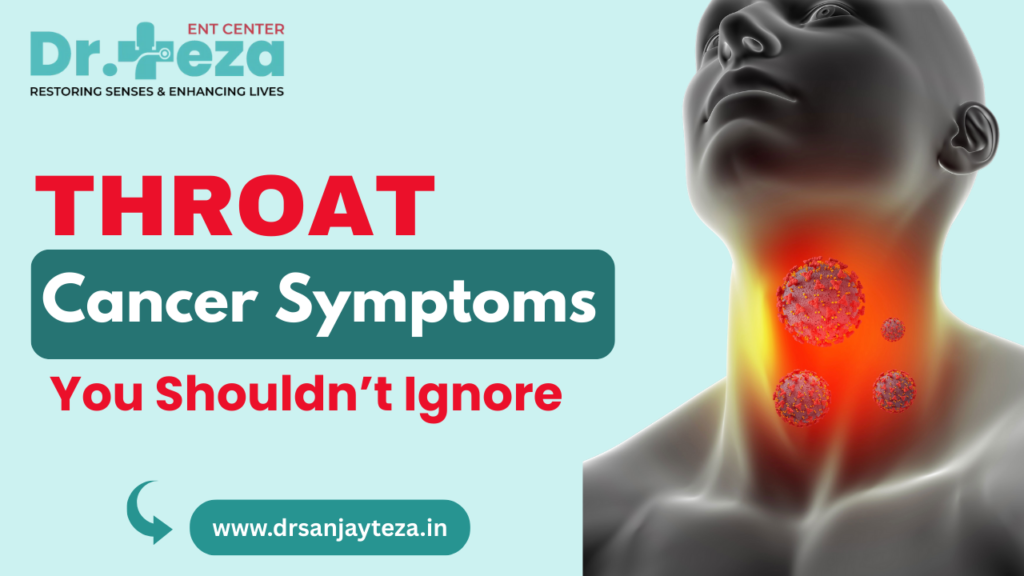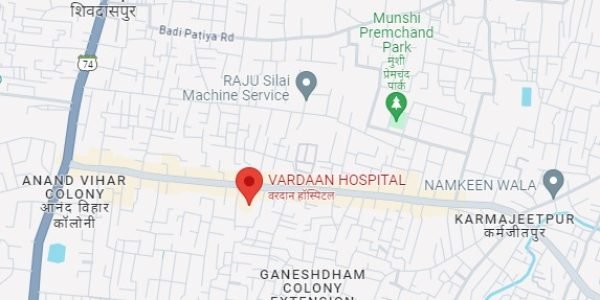
Dr. Sanjay Teza, with over 23 years of experience and more than 300,000 patients treated, is widely regarded as the best ENT specialist in Varanasi and the broader Purvanchal region
An alumnus of Banaras Hindu University (BHU) and former senior resident at Batra Hospital, New Delhi, Dr. Teza is a master of advanced techniques such as endoscopic nasal and skull-based surgeries, supported by high-end equipment like Modular OTs and the Carl Zeiss Microscope . He brings exceptional clinical acumen, a compassionate patient-first approach, and multiple healthcare awards to his practice
This blog guides you through the early and advanced symptoms of throat (laryngeal) cancer, as well as when to seek the expertise of an ENT specialist, such as Dr. Teza.
Understanding Throat Cancer
Throat cancer refers to malignant tumors that develop in the throat (pharynx), voice box (larynx), or tonsils. The most common type is squamous cell carcinoma, often linked to smoking, alcohol use, and persistent HPV infections. Early recognition of symptoms significantly improves prognosis. Here’s what to watch for:
Early Symptoms
1. Persistent Sore Throat or Throat Pain
A lingering sore throat lasting more than two weeks—especially one that doesn’t respond to standard treatment—can be an early sign. Pain may intensify when swallowing or talking.
2. Hoarseness or Voice Changes
Sustained hoarseness, especially beyond two weeks, suggests vocal cord involvement. Note any progressive changes in pitch, volume, or clarity.
3. Difficulty Swallowing (Dysphagia)
If swallowing becomes painful or feels like something is stuck, particularly with gradual onset, it warrants evaluation for possible tumors in the throat or esophagus.
4. Ear Pain (Referred Pain)
Throat cancers can cause ear pain due to nerve pathways. Unexplained, one-sided earaches—particularly with swallowing or neck pain—should be investigated.
5. Unintended Weight Loss
A noticeable drop in weight, likely due to difficulty eating or lasting throat pain, raises concern for malignancy.
6. Persistent Cough, Sometimes with Blood
Chronic cough, especially with blood (hemoptysis), is a red flag and requires immediate attention.
Advanced Signs to Monitor
7. Neck Lumps
A swelling or lump in the neck that persists for more than a few weeks may indicate cancer spread to lymph nodes.
8. Breathing Difficulties or Noisy Breathing
Tumors can obstruct the airway, resulting in stridor, labored breathing, or visible effort when inhaling.
9. Voice Loss or Frequent Coughing
Complete voice loss (aphonia) or an unbearable cough may signal advanced laryngeal involvement.
10. General Fatigue and Weakness
Persistent tiredness, fever, or night sweats without other explanations could accompany cancer progression.
When to Consult Dr. Sanjay Teza
If you notice any of the above symptoms for more than two weeks—even subtly—it’s advisable to book an appointment with Dr. Teza. His two prominent clinics in Varanasi are:
Dr. Teza combines state-of-the-art ENT diagnostics and endoscopic tools—including microscopic and laser-aided procedures—to provide accurate assessments and tailored treatments.
What to Expect in Evaluation
1. Medical History & Examination: Dr. Teza will explore risk factors like tobacco and alcohol use, exposure to HPV, and symptom duration, followed by a thorough throat and neck exam.
2. Laryngoscopy/Endoscopy: Using advanced endoscopic tools, he visualizes the throat and larynx for suspicious lesions.
3. Imaging Studies: If needed, X-rays, CT, or MRI scans may be prescribed to assess the extent of tissue involvement.
4. Biopsy: Suspect areas are biopsied for pathology to confirm a cancer diagnosis.
5. Staging Work-up: If confirmed, staging determines cancer spread—critical for planning surgery, radiotherapy, or chemotherapy.
6. Personalized Treatment Plan: Dr. Teza collaborates with oncology teams to tailor treatment—whether surgery, radiation, or combined modalities.
Why Choose Dr. Sanjay Teza
- Vast Experience: 23+ years treating ENT conditions, including complex throat disorders
- Impressive Patient Outcomes: Over 300,000 patients treated and multiple industry awards
- Cutting-Edge Facilities: Use of Modular OTs, Zeiss microscopes, laser technologies, and high-precision endoscopic systems
- Human-Centered Care: Praised for compassionate, ethical, and individualized patient management
Conclusion
Being alert to throat cancer symptoms—like ongoing sore throat, voice change, swallowing difficulty, and neck lumps—can dramatically improve outcomes. Consulting a seasoned ENT specialist like Dr. Sanjay Teza ensures expert, compassionate care backed by advanced diagnostics.
Common signs may be benign, but if they persist beyond two weeks—or come with red-flag symptoms—don’t delay in seeking help. Early evaluation by a trusted ENT specialist can make all the difference.
Book your Appointment Today
- Visit our GMB profile: Dr. Sanjay Teza ENT Center
- Address:
✅ वरदान हॉस्पिटल, सुंदरपुर, वाराणसी | 10AM–2PM
✅ शाकम्भरी काम्प्लेक्स, भेलूपुर, वाराणसी | 5PM – 7PM - Phone: 093369 22349
- Website: https://drsanjayteza.in/
- Follow us on 👉: Facebook & Instagram
Frequently Asked Questions
Q1: When should I worry about a sore throat?
If it persists for more than two weeks, especially with hoarseness, difficulty swallowing, or weight loss, seek ENT evaluation.
Q2: Is hoarseness always cancer-related?
No—hoarseness could result from infection or strain. But if it lasts beyond 2–3 weeks, it’s best evaluated by an ENT specialist like Dr. Teza.
Q3: Can throat cancer affect hearing?
Yes—Throat tumors can cause referred ear pain through shared neural pathways. If you’re experiencing unexplained earache with throat symptoms, consult an ENT.
Q4: How fast does throat cancer progress?
Progression varies by individual and type. Early detection leads to significantly better outcomes.
Q5: What exams diagnose throat cancer?
Typical evaluation includes a medical history, throat examination, endoscopy, imaging (CT/MRI), and biopsy.
Q6: Why choose Dr. Sanjay Teza in Varanasi?
His depth of experience, advanced diagnostic and treatment tools, and personalized approach make him a trusted choice.
Q7: Can throat cancer be treated successfully?
Absolutely—particularly when caught early. Thanks to improved surgical and radiotherapy techniques, survival rates have risen.
Q8: Is throat cancer painful?
Initial stages may be painless or mimic a simple sore throat. Persistent symptoms are what raise concern.
Q9: What role do lifestyle habits play?
Tobacco, alcohol, and HPV infection notably increase risk. Dr. Teza often advises preventive strategies alongside treatment.
Q10: Can children get throat cancer?
It’s rare in children. In youngsters, persistent throat symptoms are more likely due to infections or reflux—but any lasting symptoms should still be assessed.

